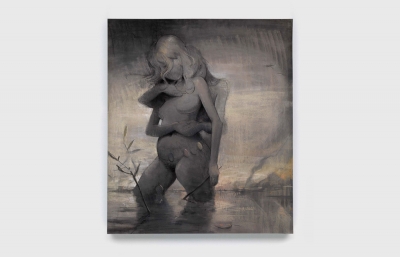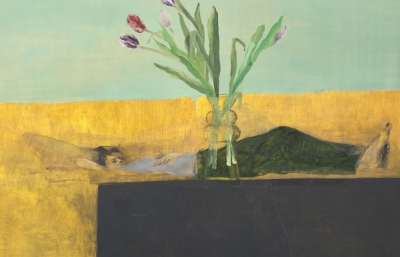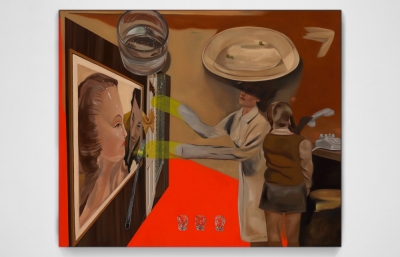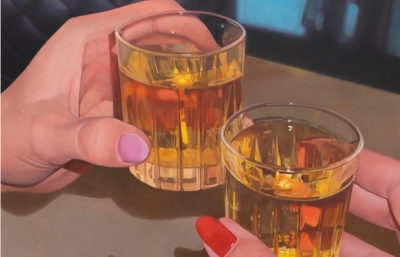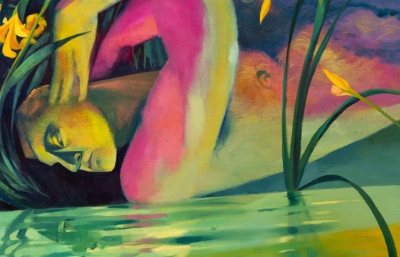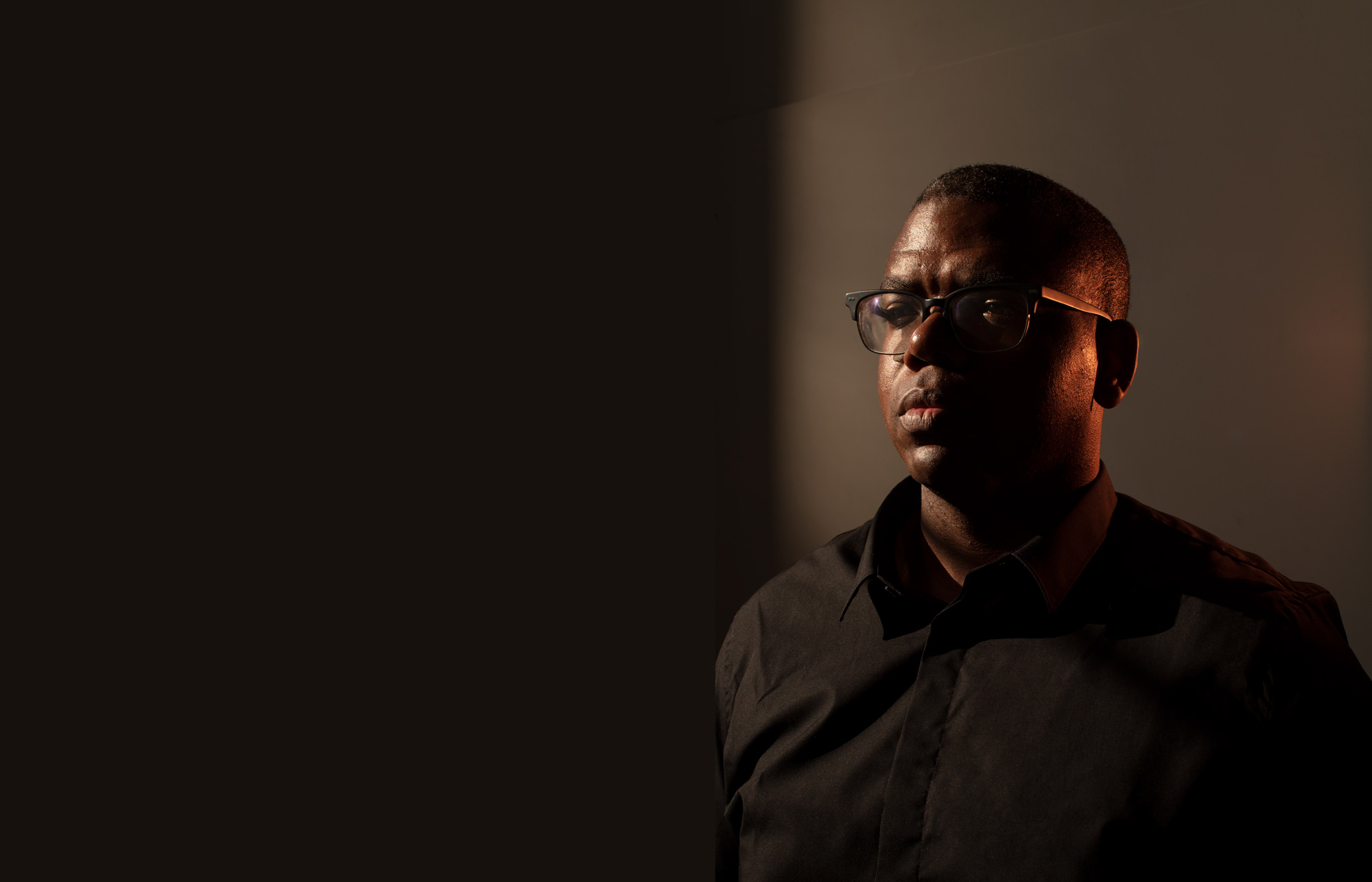
Mark Thomas Gibson
Comics Out Of Chaos
Interview by Evan Pricco // Portrait by Michael Marcelle
Maybe not the literal, comic in illustrated narrative form, but we have rediscovered the comic book. The power of metaphor in great comic book art is being utilized in fine art in recent years in some extremely refreshing and poignant ways. Connecticut-based fine artist Mark Thomas Gibson has been at the forefront of a politically charged, post-apocalyptic comic-book style that captures both nuanced and literal narrative-based art-making. His most recent exhibition, Gauntlet, at Gallery Loyal in Stockholm, Sweden, depicted a vacant, ravaged world, backdrop to an undefined socio-political disaster. “I feel like I’ve been running a gauntlet,” the artist says. “Everything that felt logical or functional has been tossed into chaos. The larger world is madness and my country is being run by a madman. Everything comes into question: my politics, morality, history, love, friends, and work. Nothing is sacred and the volume is cranked to 11.” I sat down with Gibson just after his show in Sweden opened and we talked about his love of comics, how Miami shaped him, as well as his approach to political art in 2018.
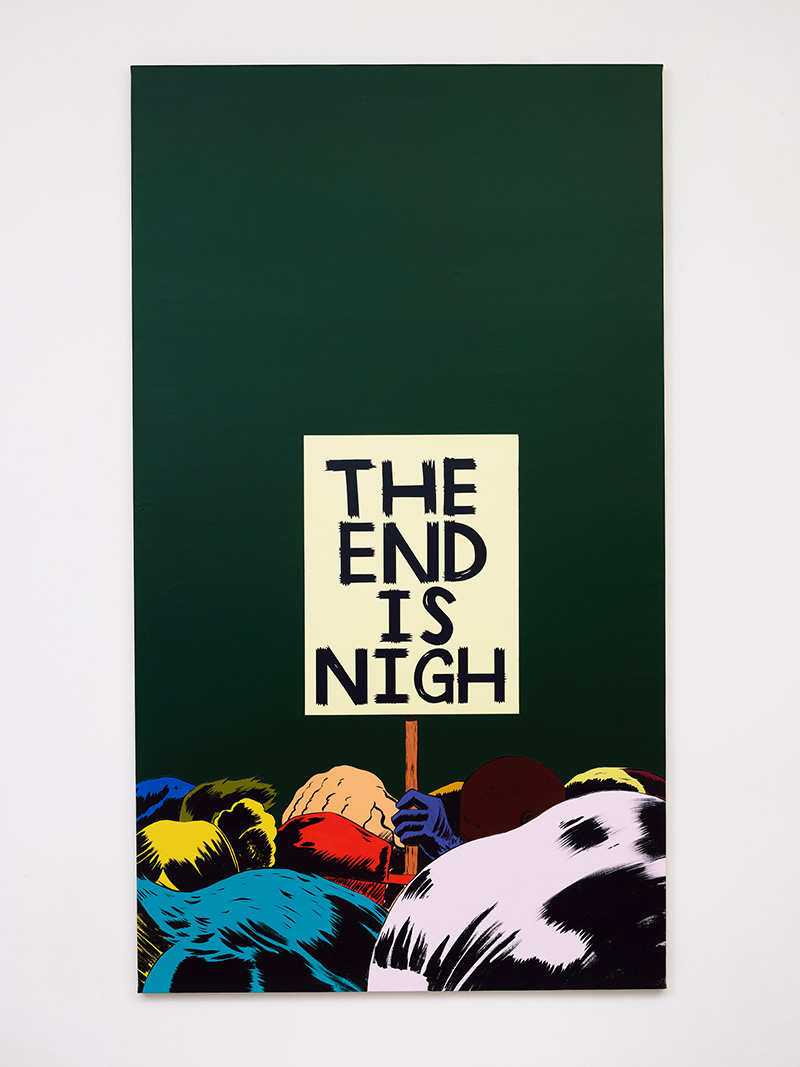
Evan Pricco: I think the first question I have to ask is, could you define your relationship to comic books?
Mark Thomas Gibson: Like most people, when I was a kid, I began picking up comics for the artwork. There was no judgement as to whether this was valid or worthy of my time. It was simply following your eyeballs from one great image to another, skipping over whatever didn’t make the cut. As time passed, I became more interested in the potential of comics and graphic novels.
I ask because you have a very strong ability to create work that feels like a single frame but is part of a larger story. Do you do the writing as well?
I write a little but a lot of the narrative is composed in my head. I jot things down in a sketchbook so that the idea or scene doesn’t get away from me. I’m trying to write more, but it doesn’t have the same effect of filling out the narrative for me that drawing does. When I am making work, there tends to be plenty of forks in the road. So, I usually try to go down the path where I don’t know the answer to the question. Writing helps me to shore up some of those decisions.
Did you have a favorite comic book?
That question is always a tough one to answer. I feel a pressure to either show off my depth of knowledge, which will most likely be shallow, or I will pick something that sounds lazy. Perhaps this has more to do with me than with the question? Some comics stand out for various reasons; the Infinity Gauntlet series stands out, and I remember reading it with a friend on our school bus after school. It was the feeling of sharing a story with a friend and our lack of knowledge, trying to fill out the blanks in the narrative through our collective speculation and imagination. After that, I think it would be Spawn #1 and pretty much anything Image Comics put out in their first two years. I was kid a in the early ’90s when comics came back in a big way with a lot of schlock attached. I was all in, and for the most part, spent a lot of time reading some pretty weak stuff. A short run of Wolverine, Issues #37—40 sticks out for me. Wolverine battles, then befriends a robot clone of himself accompanied by a robot that appears to be a five-year-old girl. The robot pair end up befriending an A.I. Stealth Bomber and a wolf spirit. The newly formed team time travel together. With that storyline, I guess I enjoyed the “yes, and then…” quality of the story telling just one more ridiculous idea after the other. To keep it really simple, I will go to my two pillars, The Dark Knight Returns and The Watchmen. But then there is Maus, Black Hole… the list goes on and on. If the question is about what ongoing series I’m interested in, then I would have said Robert Kirkman’s Invincible. I will stick with that with a close parallel runner-up being Ta-Nehisi Coates’s Black Panther run. I’ll stop there.

It's intriguing that you became interested in the "potential of comic books," because a good action hero comic book really should be a metaphor for the times they are written. That is why I do love a few of the comic films that have come out this century, like Nolan's Batman trilogy, Black Panther, and Deadpool, which all capture a societal mood. Good art should do that.
I have been questioning the potential for comics or entertainment, for that matter, to make commentary about the moment. It is important that it occurs, but I think, at the same time, there are varying degrees of relevance. For me, the reason a comic movie lives or dies is about whether the villain is interesting. If the villain’s intention is too grandiose, we lose sight of the problem and it all becomes spectacle. I think that’s what made Killmonger and Thanos interesting: when their reasoning is expressed, they possess a cold, hard logic, but it’s still a logic. As viewers, we can become tempted into agreeing with this hard outlook and the sense of power around their solution being so black and white. The President of this Country represents the same outlook, where the answers are all cut and dried. Callous logic and behavior is revered as vision. What complicates things more in the comics or fantasy world is that the extremes that cause the perspective of the villain heighten the justification of the villain. Killmonger, in his reality, has a valid case against the conveniently isolationist agenda of Wakanda. He is right to call out a people who would allow so much suffering to exist out of fear of losing power. Though they have pride in their identity of being technologically superior they are also ruled by fear of losing that position and standing in the world.
I can’t ask that level of read or intention into all forms of entertainment, and conversely, I would say the same of art. There are possibly too many factors to consider in what makes something ‘good’ so I attempt to align myself with what moves me, a piece of art with a story attached, or being about something, moves me. That may not often move other people, and most of the time, the idea that art appears to be about something is enough. It’s complicated. Much is conjecture, but as artists, we tend to put a lot of stake in our opinions as observable truth.
I remember seeing your show at Fredericks & Freiser in 2013, Alamo Revenant, and the huge ink on paper work, There Is Going to Be a Showdown, really standing out. It was history revisited, but maybe I'm wrong in thinking that piece was a big move for you?
That was the last piece I made in that show, and on second look, it should have been where the show started. I was still in denial about where drawing could take me. I knew it was the place where I put my thoughts and my feelings. Drawing is where most people meet me and engage with the work, but I think when you grow up drawing in a comic style you catch hell in most conventional art school spaces. Looking back, a lot of those teachers were teaching from a narrow understanding and not taking into account large swaths of art history.
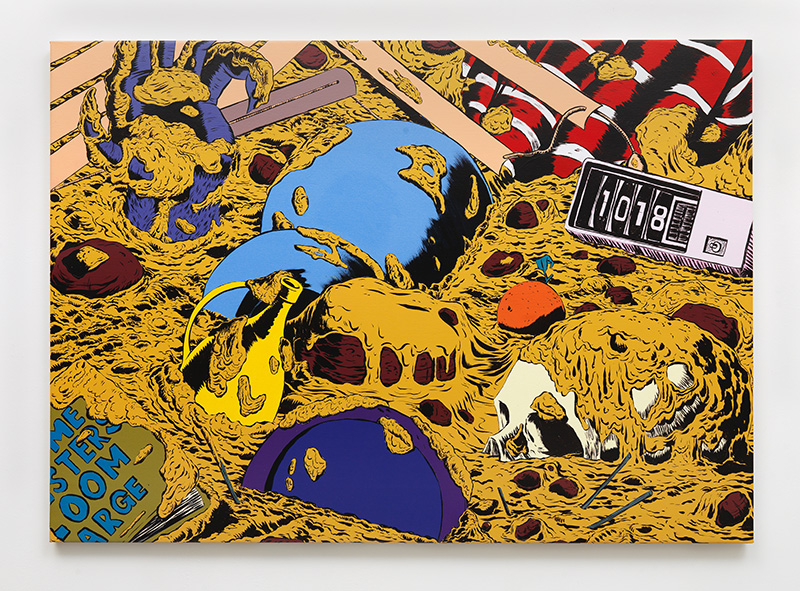
I love that sentiment about "conventional art school spaces." It’s frustrating. So, what did you do in art school? Just pretend you didn't like drawing?
I convinced myself that it wasn’t as relevant to other forms of making. I was able to smother and weaken my personal interest to serve a space of learning based on their concepts of right and wrong. In this space, my natural abilities were wrong, but could be mutated to be right. I learned that the world rewards the right way in the immediate.
You are now in the Northeast, apparently based on going to school at Cooper Union and Yale, but what was it like growing up in Miami? It has changed so much, especially in regards to art culture in the last 15 years, I wonder if you have anything to say about how it was before that boom?
I grew up in paradise. I didn’t realize it at the time, of course. I thought it was boring and slow. In pre-2000 Miami, you had direct access to that beauty with little interruption from tourists, and the six degrees of separation in your community felt more like three degrees. My dad grew up in Overtown and Liberty City and I was born and raised in Carol City. There is still a level of southern charm that remains in that space where an impromptu visit to someone’s home is still acceptable. In high school, my friend and I would hang out in South Beach at night during the week. The beach would be empty except for a few German tourists having sex in the shadows of the shore. The light from Ocean Drive was dim from failing hotels. We would sit in darkness or the light of the moon. We would sneak beers and talk. There was a peace between you, your friends, and the sound of crashing waves. Miami now is like a movie scape of high rises and sports cars. It is more and more like Disney World where a portion of the population are the attractions.
Does any of that old Miami as a movie backdrop seep into your artwork? You describe such a romantic scenario.
Miami does come up in unexpected ways. It shows up as limbo in the beginning of my first book. The flatness of Florida can represent possibility to me.
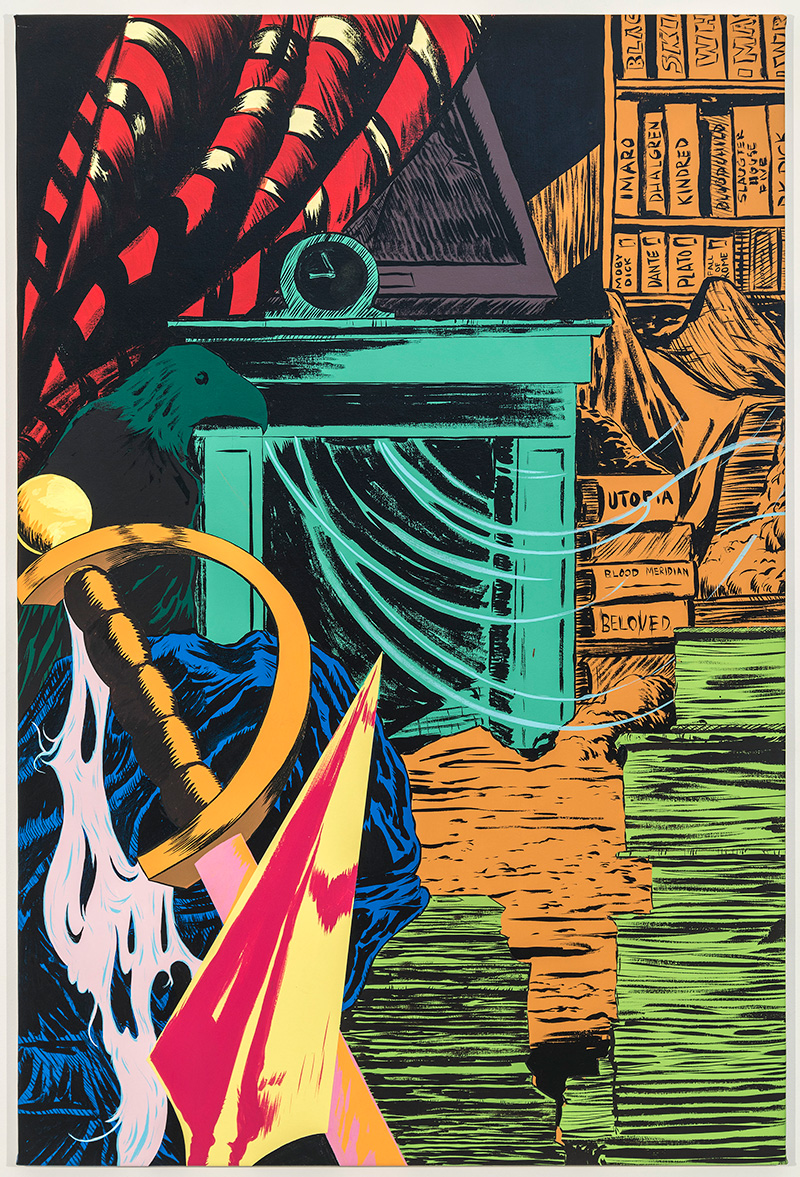
The last show of yours I saw was Early Retirement, and I remember thinking that you were going to be a really good voice to attack and critique this sort of weird undoing of American culture after those weird years of Trump’s campaign and subsequent election. Do you remember how that body of work started?
The work started with a book. I was trying to figure out why Utopia doesn’t work and why we aren’t striving for it. I had this ridiculous question to begin with, and working through the drawings, I was able to answer it for myself. As I was making the paintings for the show, I was in New Hampshire doing the MacDowell Residency, where we had little to no contact with the outside world. Still, even there, I was caught up in every decision the new administration was making. When Charlottesville occurred, I had already made my drawing Trump’s Entry into Washington. The morning after that horrible day, I made my NRA (Negro, Rifle, Association of America) drawing. This administration has given me a lot to work with, but in so many ways they pushed me into horror representation. Actually discussing American history and values tends to fit well in the tropes of horror.
This fits well into what I was thinking, because you have been mixing both American history with this almost "monster" movie motif for the past years, and your work in 2018 really seems to have this sort of post-apocalyptic, cinematic quality. Horror is a better description. What is on your mind now in the studio?
We are living in a cultural epoch. We are living in a time of massive changes, the sort of changes that divide a nation. Horror and sci-fi of the 1950s and 60s addressed similar changes by using allegory, and there was talk about racism, political fear, gender strife, and a host of issues to contend with in that era. As a result of that change, I have had a consistent headache for the last two years. In my most recent show, Gauntlet, with Loyal Gallery in Stockholm, Sweden, I wanted to present the moments after a tragedy before we begin to pick things up. The post-apocalyptic space can be the clearing out of old structures, the ugly, as well as the beautiful. In that space, we are left with opportunity to do what we really want to do.
So, part of what I am working on is a new book about murder and vengeance I am also working on a series of work inspired by Japanese Shunga prints depicting interracial sex scenes. We need to get back to art that has representations of the physical world and people within it. I am bored of looking at stiff inactive figures staring at a camera. If I want to look at images of people looking back me all day, I’ll look at Instagram or fashion photography. There is a locked-in isolation in that imagery. I have decided to depict scenes of intimacy while delving into a murder mystery, a space for rebirth after a tragedy, a growth after the forest fire.

What's utopia for you?
I believe we are all linked together, but, for some reason, we live in the illusion that we are separate. In my Utopia, we constantly attempt to understand and empathize with one another. If we were capable of that, half of the stuff we debate and waste our time on would be mute. We could be working to get off this rock. Imagine a world without ongoing warfare.
Where do you think the art world is at now, in terms of reacting to current events? I can't quite tell anymore if art is trying too hard or not trying hard enough.
I think everyone is on their own ride through this. There are collective fronts based upon areas of profession and political beliefs. Some would say it’s art’s responsibility to react to politics but that, too, is up to the individual. However, I do think it is lame when someone takes whatever they were making beforehand and claim it is now politically active. I think that’s a crock that many artists fall into to be timely. I can’t really know any person’s true intentions so I try to be less judgemental.
Do you ever think about moving, you know, to sort of get a reflection of America from further away? I think about it all the time...
Most definitely. If there is anyone reading this article who would like me to come to a residency, please hit me up. I love Paris, I made so much good work there visiting and wandering around The Louvre for days—I was incredibly inspired by the monumentality of some of the painting there. The history of caricature, and comics as an art form are very rich, and you cannot help but be inspired by the quality of the work you find there. Artwork aside, I actually just enjoyed the city and getting around. But if I’m reaching for the beyond, it has been a lifelong dream to go to Japan. Since I was a child, that has been the place I have desired more than anything to see. I think it would change my life, so I can’t really put it into words.
Thinking back to something you said earlier, I like that you brought that up, because comic books, horror and sci-fi were at their height in the 1950s and 60s because of societal shifts or changes in perception. But art took longer to make then. Or it was a longer process from artist to consumer or viewer. Now, art comes out instantaneously in response to societal shifts or changes in perception. Like, we barely digest a moment of news and there are memes, paintings, drawings, music videos, etc., out just the day after. And then there is criticism of such art instantaneously afterwards. I think I'm getting overwhelmed. I'm not sure how you feel, but I guess I'm asking, how do you feel about this? Where do you fit in?
I always think, “How can I break left?” It has made my life and career move at a creep, but it’s steadily upward. I think about what is mine and what’s going on my side of the street before I finger wag at others. On my side of the street, I am trying to think about the midterm election, I am praying Robert Mueller has his act together, and I will start working on my third book this fall. The book is about masks, justifiable vengeance and all forms of magic.
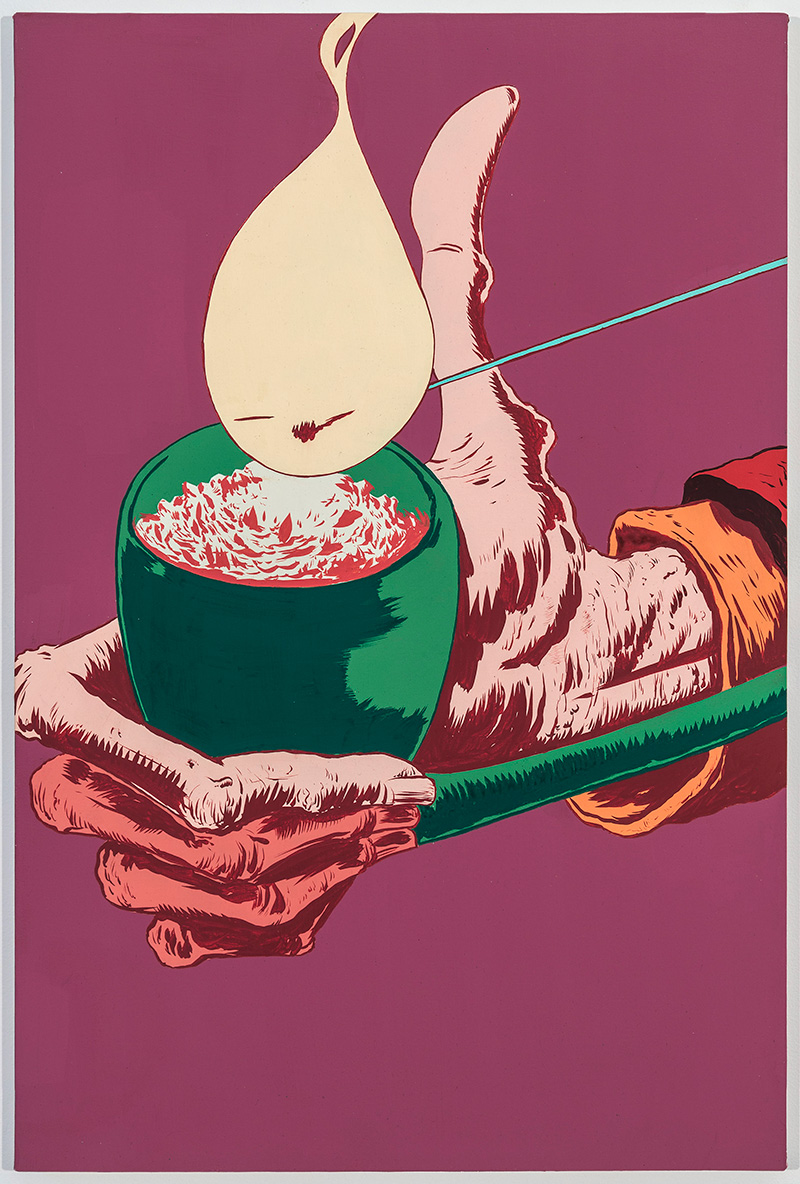
What is the ideal day for you right now?
I am trying to construct it now for myself, and it involves the freedom to choose what and when I do what I want. I like to go to the movie theater early in the day, then spend time in the studio. I know I have a really good day going when I can actually lay back and read a book without pressure.
Do you have a favorite piece of art?
I don’t know if it is my favorite piece of art but a piece I always come back to is The Deluge by John Martin (1834), and also The Raft of the Medusa by Theodore Gericault (1818—1819). I’ve never really put those two paintings together in my mind, but lately, when I get the question, I usually say one or the other. When I put them together, I guess they both are stories of tragedy and how the will of others can cast you into turmoil. Both paintings have an epic presence, though their scales are completely inverse to the depiction of the image. The Deluge describes the wrath of god and a direct yet indifferent punishment to humanity, while The Raft of the Medusa describes a world where the State, represented by the Government of France, turns their back on their very people casting them off into oblivion. In both images, we live in the aftermath and are witness to the survival of the few.
markthomasgibson.com

